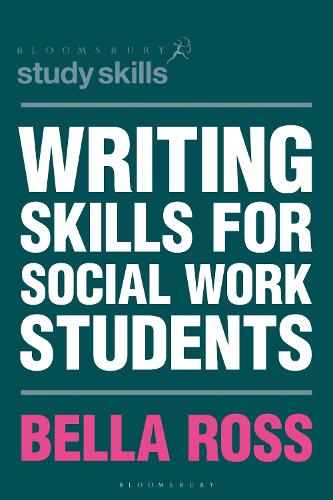
Writing Skills for Social Work Students
(Paperback)
Publishing Details
Writing Skills for Social Work Students
By (Author) Bella Ross
Contributions by Catherine Flynn
Contributions by Simon Davidson
Contributions by Steve Kirkwood
Contributions by John Devaney
Contributions by Kathryn Hay
Contributions by Uschi Bay
Contributions by Anna Lanyon
Contributions by Melissa Petrakis
Contributions by Helen Cleak
Bloomsbury Publishing PLC
Bloomsbury Academic
26th March 2021
United Kingdom
Classifications
Tertiary Education
Non Fiction
Social work
808.066361
Physical Properties
Paperback
248
Width 156mm, Height 232mm, Spine 16mm
360g
Description
This book will equip social work students with the knowledge, skills and confidence to produce first-rate written assignments. Part one focuses on the foundational skills needed to produce excellent written work. Students are taken through the core stages of working on an assignment, from planning the task and reading and note-making through to finding and evaluating sources, drafting a text, and editing and proofreading. Part two hones in on the key types of assignment students will encounter on their degree. It contains dedicated chapters on writing an essay, a reflective text, a case study analysis, a literature review, a placement report, and case notes on placement. Each chapter contains examples and activities which will help students to test their knowledge and understanding. This is an essential companion for all social work students.
Author Bio
Bella Ross is a Lecturer with the Student Academic Support Unit in the Department of Social Work at Monash University, Australia. She has developed materials for and taught academic skills and language, linguistics, and ESL subjects for almost twenty years. Bella has a passion for implementing evidence-based teaching practice and has published extensively on the topic of teaching and learning in higher education. Her research interests include communication in health care studies, social work education, and the use of technology in higher education. Uschi Bay is Senior Lecturer in the Department of Social Work, Faculty of Medicine, Nursing and Health Sciences at Monash University, Australia. Her publications focus on social work and the environment, climate change, critical reflexivity, biopolitics, neoliberalism and social work education. Her most recent evaluation project used a feminist participatory action research approach to a mid-term reflection for a major international womens development agency, with a major focus on womens action, voice and empowerment in Cambodia. Helen Cleak is Adjunct Associate Professor in the Department of Community & Clinical Health, La Trobe University, and Research Fellow in the Faculty of Health at Queensland University of Technology, Australia. She has a strong practice and research background in field education and was the Director of Field Education and International placements for over twenty years. Her book, co-authored with Jill Wilson, Making the Most of Field Placement is now in its 4th edition and has been adopted as the major fieldwork text in most Australian social work programs. Simon Davidson is the academic integrity manager at the University of Tasmania, Australia. He has a PhD in applied linguistics from the University of Melbourne. Simon has taught in the School of Languages and Linguistics at the University of Melbourne and worked as a lecturer at the Student Academic Support Unit, Monash University. His research interests include language assessment, standards of written communication and academic integrity. John Devaney is Centenary Chair of Social Work at the University of Edinburgh, UK. He has nearly twenty years experience in social work practice in relation to children and adults with learning disabilities, and then child welfare. His research interests relate to child maltreatment, domestic violence and the impact of adversity across the life course. Catherine Flynn is a Senior Lecturer in the Department of Social Work at Monash University, Australia, where her primary teaching focuses on research methods for social workers. Her core research areas include the intersection of criminal justice and social work, international collaborations/international social work and social work education and research. She has a keen interest in understanding and addressing the wider and unintended consequences of criminal justice and other policies. Kathryn Hay is an Associate Professor in the School of Social Work, Massey University, New Zealand. Kathryn teaches across field education, policy, and research methods courses and is the Associate Dean Work-Integrated Learning for the College of Health. Her research interests include work-integrated learning, social worker engagement in disaster management, and the readiness to practise of newly qualified social workers. Kathryn has published in national and international journals, edited books, and is co-author of a multi-media text on fields of practice in Aotearoa New Zealand. She is on the editorial boards of social work and work-integrated learning journals in New Zealand and the Asia-Pacific. Steve Kirkwood is a Senior Lecturer in Social Work at the University of Edinburgh, UK. He undertakes research on identity, justice and citizenship in relation to people who have been responsible for or harmed by crime or injustice. Most of his research involves discursive social psychological methods or evaluation research methods. His main areas of research include criminal justice social work, restorative justice and the integration of refugees. Anna Lanyon is a mental health clinician at St Vincents Hospital in Melbourne, Australia. She has expertise in sub-acute step up/step down programs bridging inpatient and community mental health care. Her Master of Philosophy research within the Department of Social Work at Monash University focuses on integrating and promoting recovery and strength-based practices within clinical mental health services. Melissa Petrakis is a Senior Lecturer in Social Work at Monash University, Australia. She is the Director of the Social Work Innovation, Transformation and Collaboration in Health Research Group at Monash University. Her research interests include suicide prevention, early psychosis treatment and support, needs of mental health carers and family interventions, and co-production with service users/consumers and peer workers regarding mental health service delivery. Her book Social Work Practice in Health is widely used in teaching in Australia, India, New Zealand, USA and Zimbabwe. She is on the Editorial Board of Research on Social Work Practice.
